Phone calls are often the most valuable conversions your marketing efforts can drive. According to Forrester, callers convert 30% faster than web leads, spend 28% more, and have a 28% higher retention rate. In addition, phone conversations contain rich insights you can’t get anywhere else — these callers are literally telling you what they want and how to make them happy.
That’s why leading marketers use call analytics solutions. This technology allows you to take a data-driven approach to the call channel and then, in turn, make smarter optimizations that enhance consumer experiences and drive more call conversions at a lower CPL.
In this blog, we provide a comprehensive overview of call analytics: what it is, how it works, why it matters to marketers, the data it can capture, and the questions you should ask when evaluating call analytics providers.
What Is Call Analytics?
Call analytics is a technology that uses AI to capture data from inbound phone calls. This includes call tracking data — such as the caller’s name, phone number, and the marketing source that drove the call. It also includes conversation intelligence data from the content of the conversations — like if the caller was a quality lead, the product or service they were interested in, and if they ultimately converted to a customer.
Marketers can then integrate call analytics data into their martech platforms to get a complete view of the consumer journey. You can use the insights to make smarter campaign budgeting decisions, detect issues negatively impacting conversion rates, target callers with ads based on the content of their conversations, and drive more leads at a lower CPL.
How Does Call Analytics Work?
Call analytics works by assigning unique trackable phone numbers to each of your marketing sources. These phone numbers capture caller profile and marketing attribution data when the call is placed, such as the caller’s name, phone number, geographic location, and the marketing source that drove the call. Then, the platform records the call and uses speech-to-text technology to transcribe the conversation. Finally, AI analyzes the transcription to surface actionable insights at scale, such as if the caller was a sales lead, if they expressed urgency, what products or services they inquired about, if they converted to a customer, and much more.
Call analytics data can be visualized in reports for marketers to measure performance and trends, and they can access the recordings and transcriptions of calls to learn from what’s said. Also, call analytics data can be activated in digital ad tools like Google Ads and Facebook, martech tools like Google Analytics and Adobe Experience Cloud, CRMs like Salesforce, and more to be used to drive better optimizations, decisions, and results.
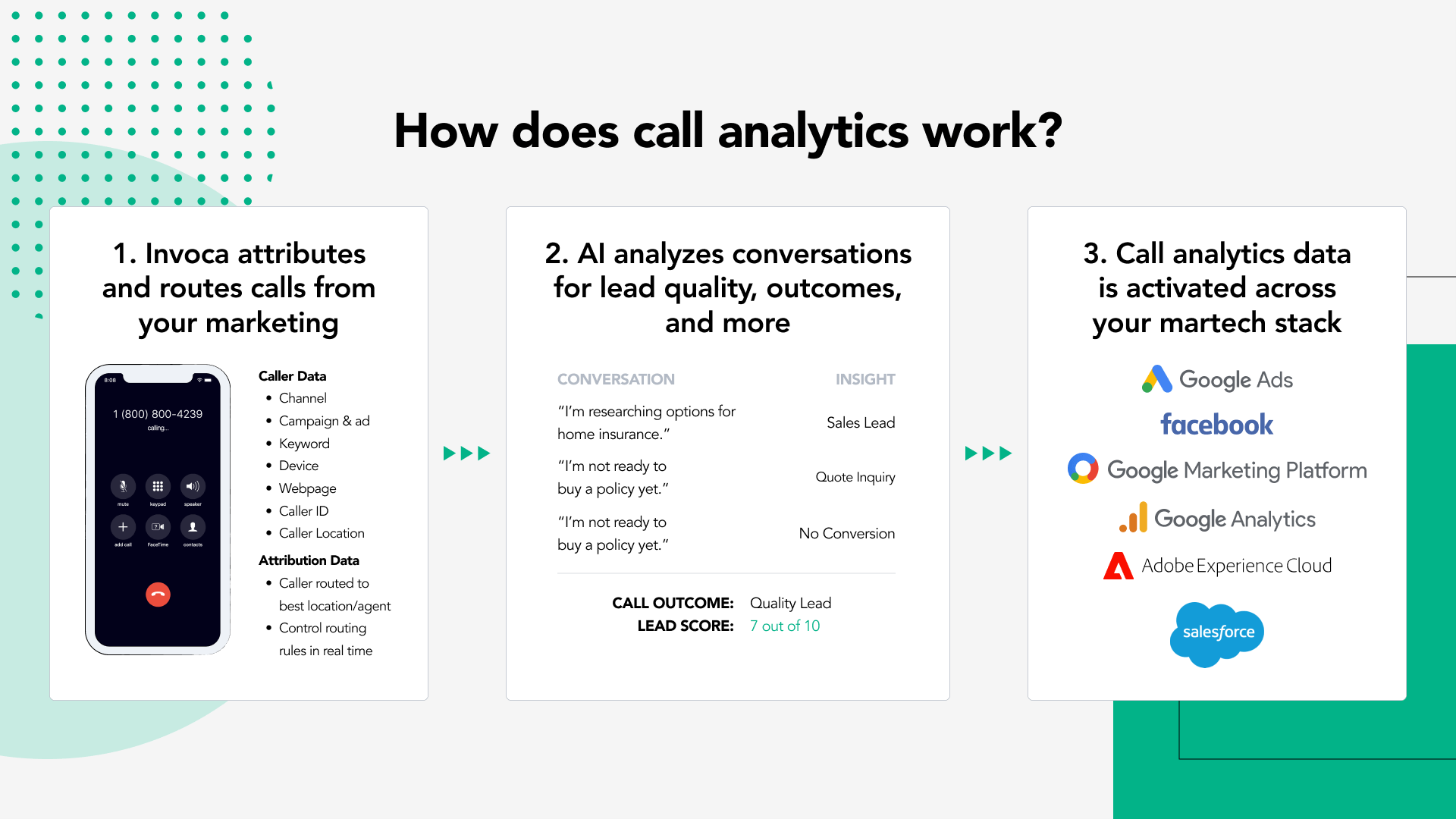
How Do I Train an AI Model for Call Analytics?
Training an AI model may sound like a daunting task to take on, but not with Invoca! Our Signal AI Studio offers no-code UI that speeds you through the process of training a custom AI model. You simply tell it the insight you want to measure, and Signal AI Studio shows you transcribed examples from your calls that either fit or don’t fit that insight. It learns with every response, creating a new AI model in no time.
Custom AI models from Signal AI Studio can accurately detect virtually any insight or topic from conversations, including:
- Caller Intent: Detect if the caller is a sales lead, current customer, new or existing patient, or job seeker
- Caller Interest: Determine the specific product or service the caller is interested in, if they are looking for help with an online order, or need support with a product issue
- Conversation Outcome: Detect if the caller made a purchase, booked an appointment, received a quote, or canceled a service
- Call Events: Discover important events like if the caller asked to be called back or to speak to a supervisor
- Voice of the Customer (VoC) Insights: Detect if the caller asked about pricing or a specific product feature, discussed a competitor, or lodged a complaint
Learn more about how Signal AI Studio works here

Why Should Marketers Use Call Analytics?
The results of search and digital advertising campaigns are easy to quantify — when everything is online. However, they become murkier when inbound calls come into play. Many marketers struggle to connect the online and offline customer journey and create a seamless omnichannel experience.
By tracking and analyzing phone conversations from each marketing channel, you can understand the full results of your campaigns and optimize your spend to drive more conversions at a lower cost. In addition, you can monitor how well your locations and sales agents are handling calls and detect issues negatively impacting your ROI. You can also more accurately determine the next best actions for the caller — such as what retargeting or lookalike campaign to put them in — based on the outcome of their conversation. As a result, you’ll be able to drive more high-quality phone leads and provide better experiences to convert those leads to customers.
What Are the Benefits of Call Analytics?
Here are our top 6 reasons marketers want the data gathered from call analytics:
- Improved Marketing ROI: Call analytics provides insights into which marketing campaigns and channels are driving phone calls, enabling businesses to allocate their marketing budget more effectively and optimize their ROI.
- Enhanced Customer Experience: By analyzing call recordings and transcripts, call analytics tracking software helps identify customer pain points and improve call handling processes, leading to a better overall customer experience and increased customer satisfaction.
- Data-Driven Decision Making: With detailed call metrics and analytics, businesses can make informed decisions based on data rather than assumptions, allowing them to optimize their sales and marketing strategies, improve call center operations, and enhance customer service.
- Call Performance Optimization: Call analytics enables businesses to monitor and analyze key call performance indicators such as call duration, call abandonment rates, and call conversion rates. This information helps identify areas for improvement and implement strategies to enhance call quality and conversion rates.
- Sales and Lead Generation Insights: By tracking and analyzing calls, businesses can gain valuable insights into the effectiveness of their sales and lead generation efforts. Call analytics software can identify the sources of high-quality leads, highlight successful sales tactics, and identify areas for sales team training and improvement.
- Competitive Advantage: Utilizing call analytics tracking software allows businesses to gain a competitive edge by understanding their customers' needs and preferences better. This knowledge enables them to tailor their products, services, and marketing campaigns to meet customer demands more effectively than their competitors.
Quick Statistics About Call Analytics
We published a comprehensive blog post covering call analytics statistics here, but for the sake of brevity, here are some of the highlights:
- Companies, on average, see an 81% ROI from deploying speech analytics technology (source: Opus Research). This stat highlights the significant financial benefits that businesses can reap by including call analytics. It showcases the potential for substantial returns on investment, encouraging companies to adopt speech analytics as a valuable tool for improving their operations and customer interactions.
- 46% of consumers are very likely to stop buying from a business or using its services if their calls repeatedly go unanswered with no other channels available for help (source: Vonage). This is important because it underlines the critical role of effective call handling and customer support. It underscores the significance of prompt and reliable communication, emphasizing the potential consequences businesses face when they fail to meet customer expectations in terms of accessibility and responsiveness.
- 52% of companies have accelerated their AI adoption plans (source: PwC). This statistic underscores the significance of AI as a transformative tool that can reshape business operations. If you're not integrating it into your long-term plans, you might fall behind the competition!
What Industries Should Use Call Analytics Solutions?
Any industry that relies on inbound calls to acquire customers should use a call analytics solution. Phone calls are especially important to industries with complex, expensive, or urgent purchases. Examples include automotive, home services, B2B, technology, financial services, e-commerce, healthcare, education, insurance, travel and hospitality, senior living, retail, lead generation, direct response, real estate, and more.
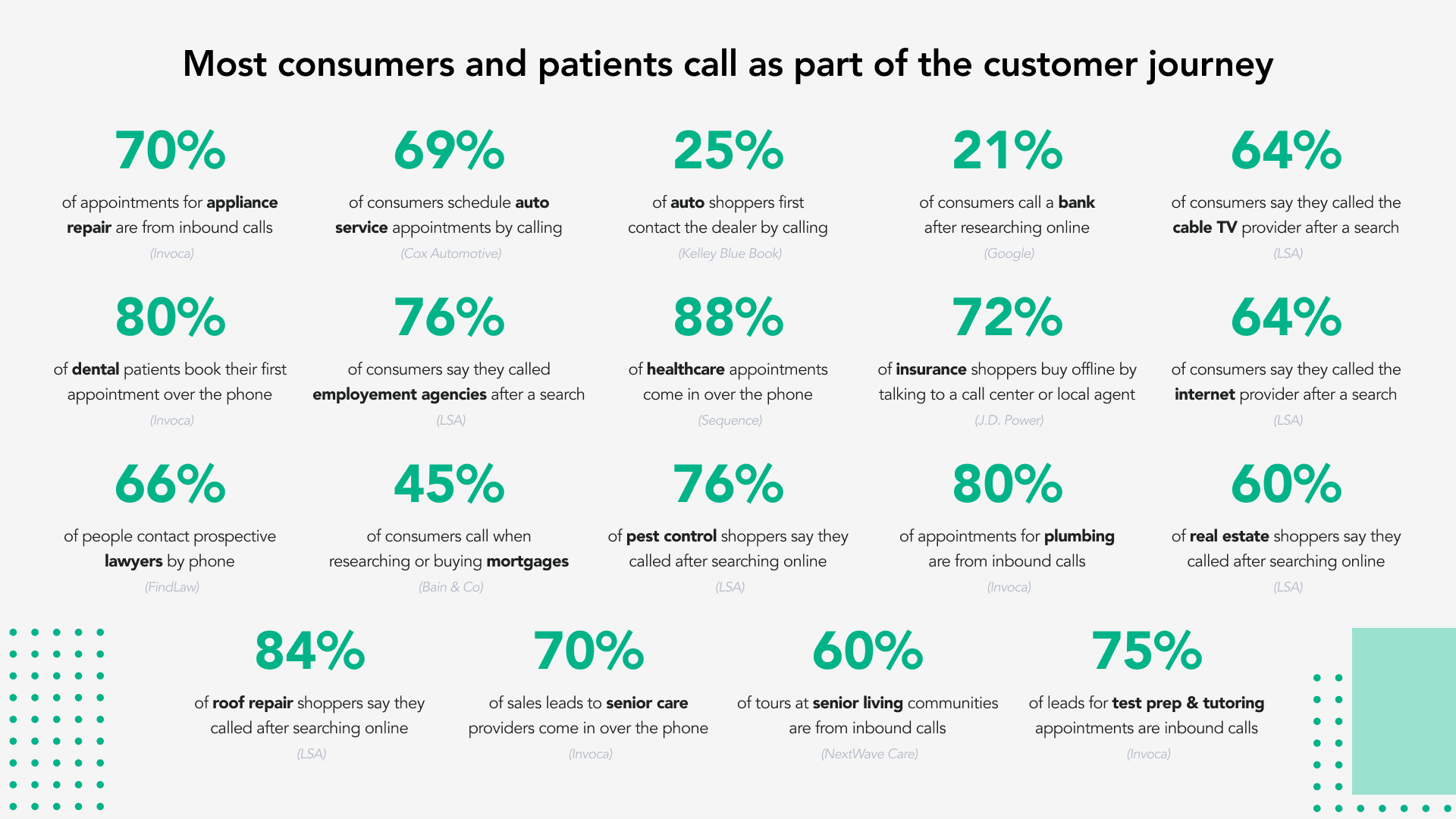
What Data Can Call Analytics Solutions Capture?
Call analytics software provides varying levels of insights, depending on if they use AI to analyze calls and the ability of their AI to uncover insights. Below is a list of some of the insights Invoca can capture from inbound calls:
- The channel, campaign, ad group, keyword, and webpage that drove the call
- The device the caller used to engage with your marketing
- The day and time the call
- The caller’s name
- The caller’s phone number
- The geographic location they called from
- If they’re a new or repeat caller
- If the call was answered
- If the call went to voicemail
- How long the caller waited on hold
- If the caller abandoned the call
- The duration of the call
- If it was a sales or appointment opportunity
- What products or services the caller expressed interest in
- The call’s lead score, on a scale of 1 to 10, based on the conversation
- If the caller is looking to make a purchase soon
- If the call resulted in a sale or appointment
- If a CX issue occurred on the call
Examples of Call Analytics Reports
1. Call Tracking Reports
These reports show how many total calls and sales opportunity calls each of your marketing channels is driving. They also show the average lead score and the close rate of those calls. In addition, you can see which of your search keywords and website pages generate the most calls that are quality sales leads.
2. Call Transcripts
Call analytics solutions like Invoca allow you to drill into individual call transcriptions to understand the voice of your consumers. You can use these transcrips to understand consumer trends and pain points, learn the questions they need answered before converting and proactively answer them on your website, determine why calls are converting or not and areas to improve, and coach your sales agents and locations on effective call handling techniques.
Transcripts are only as valuable as they are accurate, and Invoca’s new transcripts are second to none. To ensure their accuracy, our data science and engineering teams took best-in-class generative AI LLMs and spent the last year training them on nearly 1 million hours of supervised audio data. The result is transcription technology with an industry-low WER (word error rate). There is truly nothing like it.
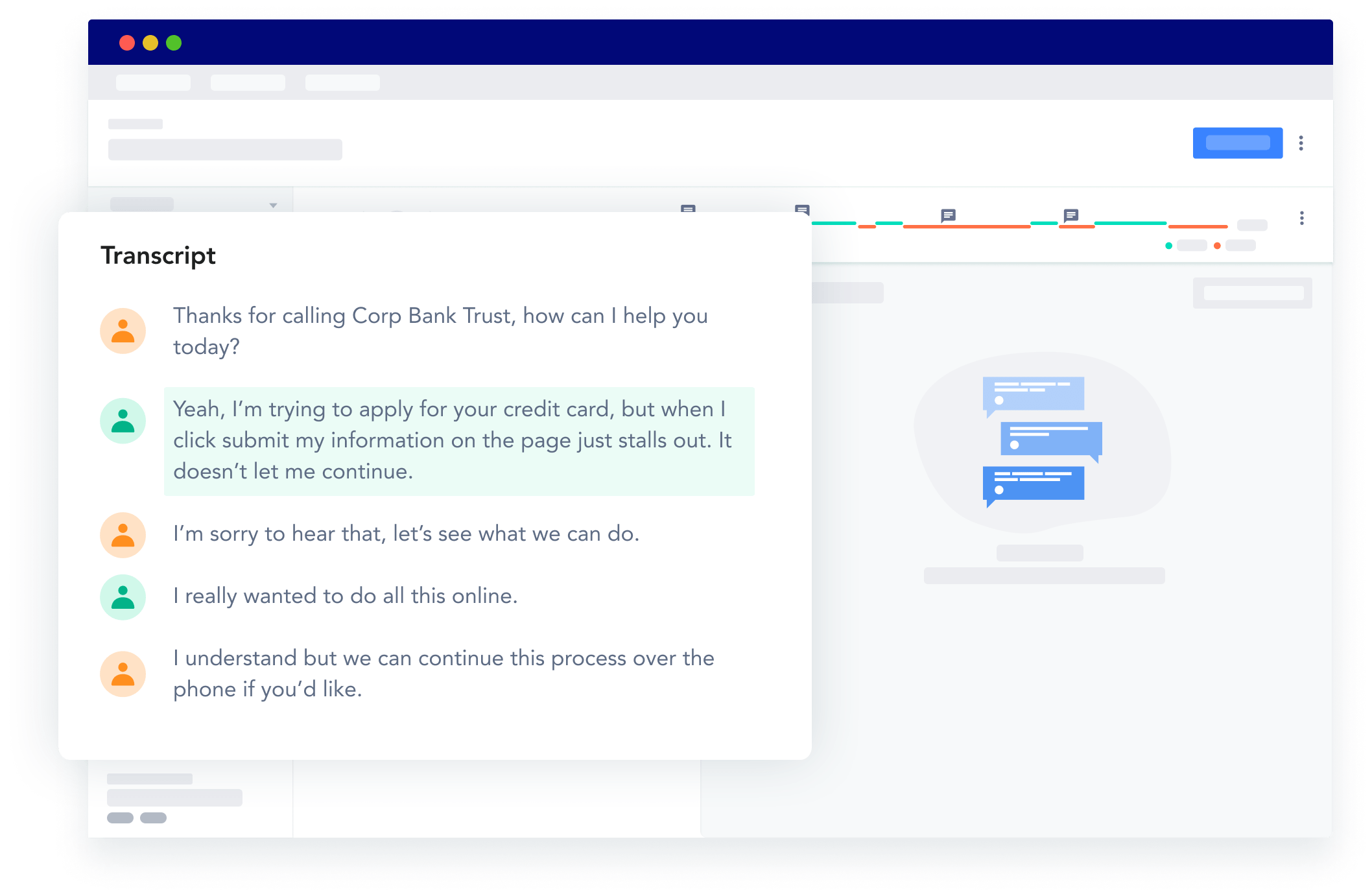
3. Agent Performance Scorecards
Call analytics solutions like Invoca allow you to automatically QA your sales agents’ calls, based on your own criteria. This gives your agents immediate feedback they can use to improve their performance. You can also comment on the transcripts in real-time to give your agents additional coaching.
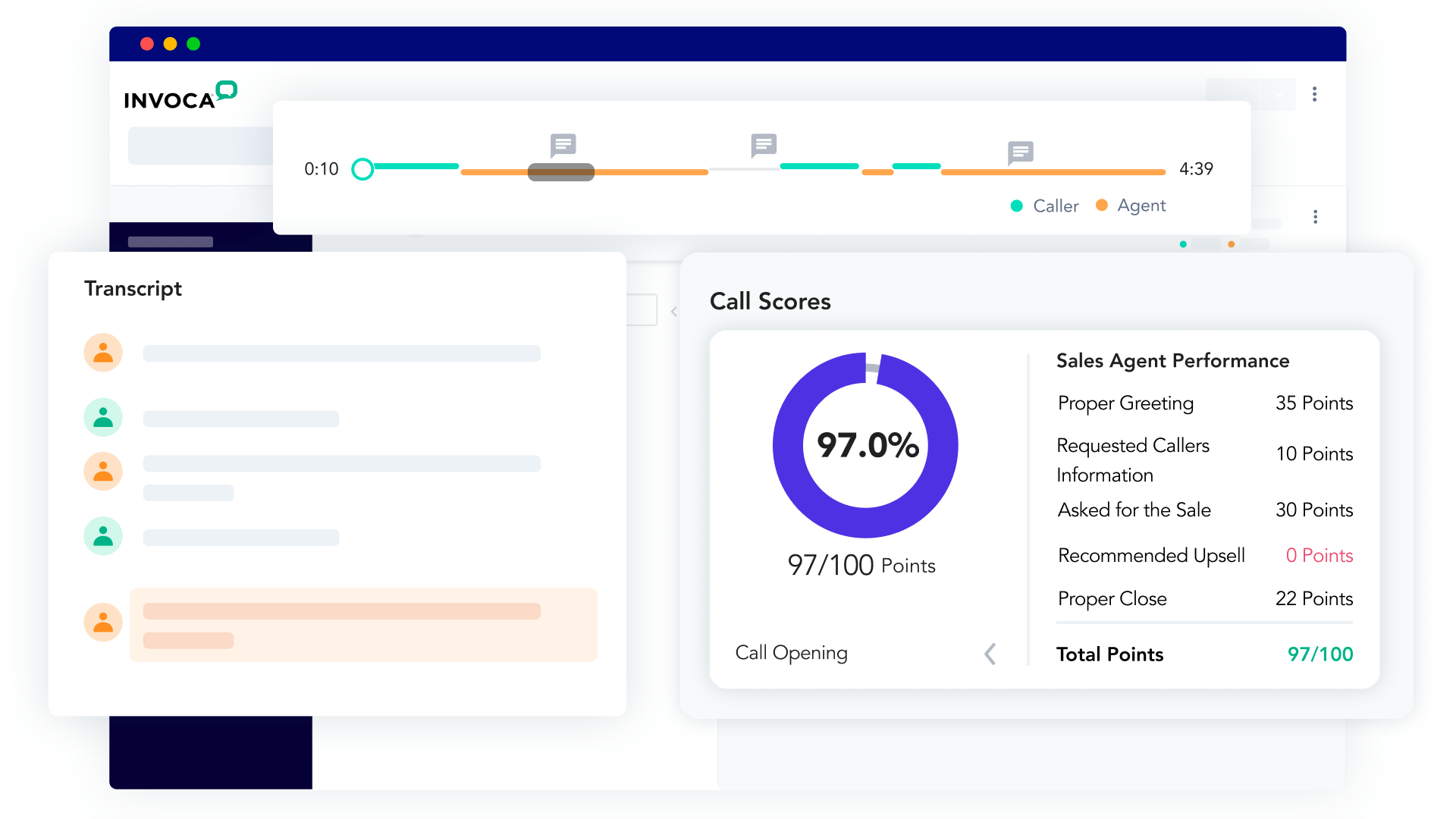
4. Sentiment Analysis
A key aspect of improving the call experience is making sure agents handle customer inquiries effectively — that means keeping tabs on caller sentiment. When it comes to analyzing sentiment, most speech analytics tools only track the overall sentiment of a call, flagging a call as either “positive” or “negative.” But many marketers say that call-level sentiment isn’t particularly useful or actionable.

We believe that the real opportunity lies in the ability to track caller and agent sentiment separately, and monitor how it changes throughout a conversation. So we built our sentiment analysis solution to not only track the individual sentiment of the caller and the agent separately, but also how it changes throughout the call. This makes it possible to monitor how effective agents are at turning a callers’ negative sentiment into positive, as an example. You can, in turn, use this data to collaborate with your contact center team to deliver better customer experiences.
5. Topic Explorer
It can be difficult to sift through your mountains of voice-of-the-customer data to identify trends. That's where Invoca Topic Explorer comes in. This tool allows you to visualize the themes and related topics being discussed across thousands of your calls at once to surface unexpected insights. You can specify the topics or categories you want Topic Explorer to visualize, view GPT-powered descriptions of topic summaries, and review transcribed examples from actual calls. Topic Explorer is a unique and powerful way to surface new and actionable insights on customers, call experiences, agent performance, and digital marketing campaigns you weren’t using Signal AI Studio to actively analyze.
With these insights, you can tweak your marketing copy to align with customer needs, improve your contact center scripts, correct issues harming call conversion rates, and much more.

What Are Popular Call Analytics Integrations?
1. Google Ads
When you push call analytics data into Google Ads, you can more accurately measure ROI, personalize experiences, and optimize campaigns and keyword bidding strategies to acquire more customers at a lower cost per conversion. You can also get better results from Google Ads Smart Bidding since Google can optimize campaigns based on what’s driving the most valuable call conversions — not just call volume.
2. Google Analytics
When you pass phone call analytics data into Google Analytics, you get accurate reporting on consumer behavior trends, what’s happening in your call channel, and the value of each call from each source, giving you a holistic view of consumer behavior and marketing performance. You can measure the conversions and revenue of all your channels, ads, keywords, campaigns, and webpages and can then optimize for what drives the most customers and revenue at the lowest CPL.
3. Salesforce
Passing call analytics data into Salesforce enables marketing teams to measure the true value of calls from their marketing. You can connect calls from each channel, campaign, ad, and search keyword to leads, opportunities, and downstream revenue and use that data to prove ROI and make smarter marketing optimizations to increase revenue and eliminate wasted spend. Sales teams get new intelligence on callers in Salesforce to better understand their prospects and customers, tailor follow-ups for those leads most likely to convert, and uncover the best tactics to turn callers into customers.
4. Facebook and Instagram
When you pass call analytics data into Facebook Ads Manager, you can view how well your ads are driving phone call leads. You can then allocate your budget to the ads driving the most conversions — both online and over the phone. In addition, you can retarget past callers (both leads and customers) from both Facebook and other channels with the right ads or expand your reach by targeting new lookalike audiences resembling your most valuable callers.
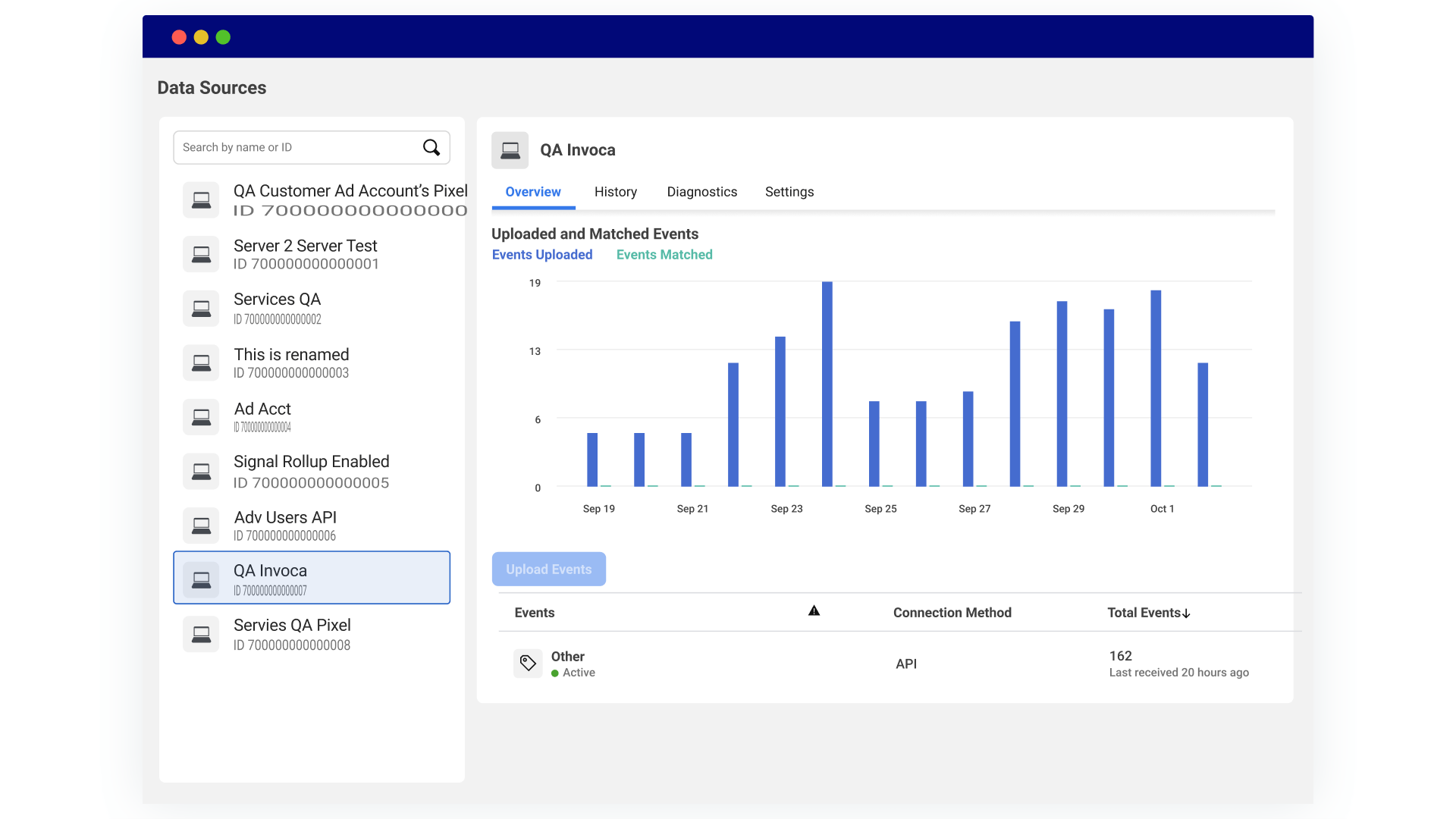
Sample report showing Invoca data in Facebook Ads Manager
Here is a list of martech platforms you can push phone call analytics data into.
What Questions Should I Ask When Evaluating Call Analytics Providers?
Many providers offer basic directional phone call analytics data, such as whether or not a call happened. But that’s just scratching the surface. If you’re a true data-driven marketer, you want all of the insights available to you — like detailed insights into call intent, outcome, and value from conversations and the ability to drill down into call recordings and transcriptions to learn detailed insights into consumers and call handling. When evaluating call analytics providers, you should dig deep to determine which provider will give you the most powerful insights. Here are some important questions to ask when vetting call analytics vendors:
- Is the solution PCI-compliant?
- Is the solution HIPAA-, GDPR-, and CCPA-compliant?
- How accurate is the speech-to-text call transcription technology?
- Does the solution allow you to view your call transcriptions?
- What insights can the AI detect from phone conversations?
- Can the vendor tailor an AI model for your unique business needs?
- Does the AI require you to listen to phone calls and label them to train it? If so, how many?
- Can the call analytics solution pass insights into the marketing and sales tools and digital ad platforms your business uses?
How Do Leading Companies Use Call Analytics Software?
Below are a couple examples of how industry leaders use analytics to drive better business results.
Example: Spectrum Retirement Communities
Spectrum Retirement Communities, a senior living provider, used Invoca's call analytics to gain valuable insights from customer conversations and adapt their approach to address COVID-19 concerns. By analyzing call recordings and transcripts, Spectrum Retirement Communities identified specific concerns and questions related to the pandemic, allowing them to make informed decisions and implement necessary changes to their facilities and operations.
With Invoca, Spectrum Retirement Communities successfully modified their protocols to prioritize resident safety and address COVID-19 concerns. They implemented new safety measures, updated visitation policies, and enhanced sanitization protocols based on insights derived from customer conversations. These adjustments aimed to provide a safer and more comfortable living environment for their residents.
The results were remarkable and speak for themselves:
- 16,000 calls were routed through Invoca
- 160 positive customer reviews were posted
- Spectrum saw a 20% decrease in their resident turnover
Read the full Spectrum Retirement Communities case study here
Additional Reading
Want to learn more about how Invoca’s AI-powered call analytics can help you drive more revenue? Check out these resources:

.jpg)